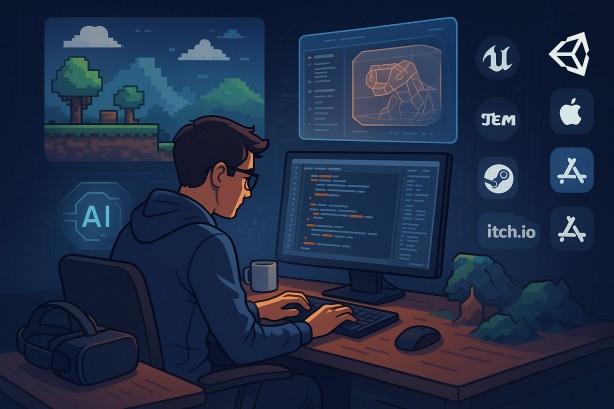Estimated Reading Time: 10 Minutes
Game development continues to evolve rapidly with emerging technologies, diverse tools, and community-driven content creation. Whether you’re an aspiring solo developer, a small indie studio, or a blogger exploring gaming and tech, planning your journey for game development in 2025 is crucial.
This detailed blog post outlines a structured game development plan tailored for modern creators, packed with tools, techniques, and industry insights to help you thrive in 2025.

🖼️ Featured Image Suggestion:
A dynamic, futuristic workspace with a developer coding on a holographic screen. The background shows a pixelated game world merging with 3D models and AI-generated landscapes. Include elements like VR headsets, Unity and Unreal logos, and icons of popular platforms like Steam, itch.io, and mobile app stores.
🎯 Why Game Development in 2025?
In 2025, gaming is more accessible, diverse, and creator-friendly than ever. The rise of:
- AI-driven NPCs and level design
- Low-code/no-code tools
- Cross-platform publishing
- Blockchain-based games and ownership
- Massive indie support platforms
…makes now the perfect time to begin or level up your game development journey.
📘 Step-by-Step Game Development Plan for 2025
1. Define Your Vision & Game Idea
Every successful game starts with a powerful idea.
🧠 Ask yourself:
- What genre excites you? (e.g., platformer, RPG, puzzle, simulation)
- Who is your target audience?
- What platforms are you targeting? (PC, mobile, web, console)
- Is this a solo project or will you collaborate?
🛠️ Tools for idea brainstorming:
- Notion or Obsidian (for notes)
- Miro (for visual mapping)
- Trello or ClickUp (for task planning)
2. Select the Right Game Engine
Your engine choice shapes your development speed and capabilities.
🚀 Top Game Engines in 2025:
| Engine | Best For | Pricing |
|---|---|---|
| Unity | 2D & 3D indie games, mobile, console | Free/Pro Plans |
| Unreal Engine | High-end 3D, cinematic visuals | Free + Royalty |
| Godot 4.2 | Open-source, lightweight 2D/3D engine | Free |
| GDevelop | No-code 2D game engine | Free |
| Construct 3 | Browser-based drag-and-drop engine | Subscription |
📝 Recommendation:
Start with Godot or Unity for learning flexibility, community, and support.
3. Learn the Core Skills
You don’t need to master everything — focus on your role and outsource the rest. But if you’re solo, aim to be a “jack of all trades”.
🧩 Key Skills by Role:
| Role | Skills You Need |
|---|---|
| Game Designer | Mechanics design, prototyping, player psychology |
| Developer | Scripting (C#, GDScript, Blueprints), debugging |
| Artist | Pixel art, 3D modeling, animation |
| Sound Designer | Music composition, sound effects, audio mixing |
| Writer | Dialogue writing, lore building, pacing |
🔧 Resources:
- Brackeys (YouTube) – Unity tutorials
- GDQuest – Godot learning
- Blender Guru – 3D modeling
- Mixkit – Free sound and music
4. Build a Prototype in 30 Days
Avoid over-planning. Create a minimum viable product (MVP) or playable demo in 30 days.
🗂️ MVP Includes:
- 1 working level
- Basic controls
- One key mechanic
- Placeholder art and sound
🏗️ Tools to Speed Up:
- Unity Asset Store / Unreal Marketplace
- Kenney.nl (free 2D/3D assets)
- Tiled Map Editor (for 2D maps)
5. Test & Gather Feedback
Your first game will not be perfect — and that’s okay. What matters is user feedback.
📣 Where to Get Feedback:
- Reddit: r/gamedev, r/indiegames
- Discord: Unity / Godot / Indie Dev groups
- Itch.io: Publish a demo and gather comments
- PlaytestCloud: For mobile testing
📋 Tools:
- Google Forms (for surveys)
- Loom (for recording gameplay feedback)
- OBS Studio (for gameplay recording)
6. Polish, Iterate & Optimize
After feedback, polish your game’s:
- UI/UX
- Loading speed
- Animations
- Game balance (difficulty, progression)
🛠️ Tools:
- Aseprite (2D animation)
- TexturePacker (sprite sheets)
- Shader Graph (visual effects in Unity)
💡 Pro Tip: Don’t waste months perfecting a game no one has played. Launch quickly, learn, and iterate.
7. Prepare for Launch
Marketing is as important as coding.
📆 Create a launch plan:
- 1 month before: Announce the game on socials
- 2 weeks before: Share devlogs and sneak peeks
- Launch day: Run a campaign with influencers
📢 Marketing Channels:
- Twitter/X, Instagram, TikTok (trending platforms)
- IndieDB, Itch.io, Steam Forums
- Email newsletter using Substack or MailerLite
🎁 Tools for Hype:
- Canva / Figma – For social media graphics
- Trailer tools – Shotcut or Adobe Premiere
- PressKit() – For creating a professional press kit
8. Monetize Your Game
Monetization models in 2025 include:
| Model | Examples |
|---|---|
| Premium | Paid on Steam / App Store |
| Free-to-Play | Ads + in-app purchases |
| Subscription | Patreon or game bundles |
| Web3/GameFi (Optional) | Token/NFT-based mechanics (niche) |
🛒 Distribute on:
💸 Optional Revenue Add-ons:
- Merchandise via Redbubble or Teespring
- Devlog monetization (YouTube, blogging)
- Crowdfunding (Kickstarter, Indiegogo)
9. Post-Launch & Community Building
🎙️ Support your game post-launch with:
- Updates (bug fixes, new content)
- Community Discord server
- Monthly devlogs
- Event participation (Game Jams, Expos)
🔗 Platforms to Build Community:
- Discord
- YouTube Devlogs
- Indie Hackers
🔧 BONUS: AI Tools for Game Dev in 2025
AI can be your co-pilot:
| Task | Tool Example |
|---|---|
| Character Art | Leonardo AI, Midjourney |
| Level Design Assist | Promethean AI (Unreal integration) |
| Coding Help | GitHub Copilot, ChatGPT |
| Music Generation | Soundraw, AIVA |
| NPC Dialogues | Inworld AI |
📚 Recommended Learning Resources (2025 Edition)
- 🎓 Coursera: Game Design and Development Specialization
- 🛠️ GameDev.tv (Udemy)
- 📖 “The Art of Game Design” by Jesse Schell
- 📘 “Game Programming Patterns” by Robert Nystrom
- 🧠 Level Design Blog
📝 Final Thoughts
Game development in 2025 is a blend of creativity, technology, and community. Thanks to powerful free tools, AI enhancements, and global platforms, even solo creators can launch impressive titles.
👉 Whether you’re developing a pixel-art RPG or a high-fidelity FPS, stay focused on:
- Prototyping quickly
- Learning from real players
- Sharing your progress
Success doesn’t always come with your first game — but every project teaches you something essential.


